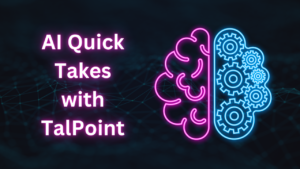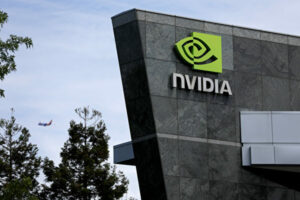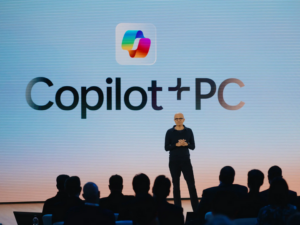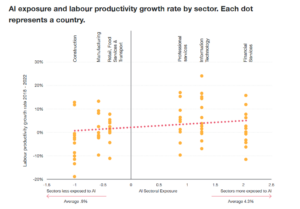Published: May 24, 2024
AI Quick Takes with TalPoint – Week of May 20
By TalPoint Marketing weekly wrap up

Your weekly source for news and updates on all things AI.
Looking for more regular updates from TalPoint? Follow us on Linkedin, Twitter, or visit us at TalPoint.com.
Read time: under 4 minutes
AI Spotlight

Nvidia’s Earnings Report
Nvidia reported exceptional growth in its latest earnings, with several key highlights showcasing its impressive performance and strategic advancements in AI technology.
The company saw outstanding growth:
- Revenue up 262% year-over-year
- Data-center revenue up 427%
- Adjusted earnings per share up 461%
Nvidia’s fiscal first-quarter revenue of $26 billion surpassed the consensus estimate of $24.6 billion, and the company’s guidance for $28 billion exceeded the FactSet consensus of $26.7 billion. Net income for the quarter was $14.88 billion, or $5.98 per share, compared to $2.04 billion, or 82 cents per share, a year earlier.
Nvidia’s stock performance was equally impressive:
- Stock rose 7% in extended trading, topping $1,000 for the first time
- Announced a 10-for-1 stock split set for early June
Adjusted gross margins reached a record 78.9%, though a decrease to 75.5% is expected next quarter.
The demand for Nvidia’s AI and data center products remains robust:
- Significant orders from major companies like Google, Microsoft, Meta, Amazon, and OpenAI
- Data center business revenue: $22.6 billion, driven by Hopper graphics processors
- Meta’s use of 24,000 H100 GPUs for its Lama 3 large language model
- Strong sales in networking parts with $3.2 billion in revenue
- Gaming revenue increased by 18% to $2.65 billion
In terms of shareholder returns:
- Repurchased $7.7 billion worth of shares
- Increased quarterly cash dividend from 4 cents to 10 cents per share on a pre-split basis (after the split, the dividend will be one cent per share)
These highlights underscore Nvidia’s impressive financial performance and strategic advancements in AI technology, contributing to its robust market position and future growth prospects.
Trending AI Technologies

Breakthrough in AI Safety: Peering Inside the Black Box
One of the most unnerving aspects of today’s leading AI systems is that even their creators don’t fully understand how they work. These systems learn on their own by processing vast amounts of data. This makes it difficult to pinpoint specific reasons for errors or unexpected behavior, raising significant safety concerns.
Anthropic’s Revolutionary Technique
Anthropic has made a significant leap forward with a new technique that allows researchers to scan the “brain” of AI models. This method helps identify collections of neurons, or “features,” that correspond to different concepts within the AI. The breakthrough was achieved using Anthropic’s Claude Sonnet model, providing unprecedented insights into its inner workings.
Enhancing AI Safety
The implications of this discovery for AI safety are profound. Researchers found that by manipulating these features, they could alter the model’s behavior. For instance, they identified a feature linked to “unsafe code.” By suppressing this feature, they could prevent the AI from generating code with potential security vulnerabilities. Similarly, features related to bias, fraudulent activity, toxic speech, and manipulative behavior were also discovered and could be controlled.
Major Implications
Anthropic’s technique revealed roughly 10 million patterns, or features, within their AI model. These features corresponded to a wide range of topics and concepts, from specific cities and scientific terms to abstract ideas like deception or bias. By turning these features on or off, researchers could significantly change how the AI responded, even getting it to break its own rules in some cases.
Looking Ahead
While this research is still in its early stages, the potential benefits for AI safety are enormous. The ability to manipulate specific features within AI models offers a promising avenue for directly impacting and improving the safety of AI systems. Anthropic’s work marks a significant step towards making AI systems more transparent, understandable, and controllable. As this research progresses, it could lead to more robust and secure AI applications across various industries.
AI Data Point
Recently there has been a lot of speculation about AI’s potential to significantly boost workers’ productivity. On one side, we have sectors like Construction, Manufacturing, and Retail, where AI exposure is limited. These areas show a mix of productivity growth, with an average increase of about 0.9%. Some countries see gains, while others face declines. On the other hand, sectors with higher AI exposure—such as Professional Services, Information Technology, and Financial Services—are experiencing significant productivity boosts, averaging around 4.3%. The red dotted trend line clearly shows that as AI exposure increases, so does productivity growth. This isn’t just data; it’s a snapshot of the future. Industries that embrace AI are not just adapting; they’re thriving. The contrast in productivity growth between low and high AI exposure sectors underscores AI’s role as a game-changer. It’s evident that AI is driving substantial gains in efficiency and performance, signaling a pivotal shift in how businesses can leverage technology for growth. For sectors lagging behind, the message is clear: embracing AI isn’t just an option—it’s a necessity for staying competitive.
Company Watch

AI Integration in Personal Computers: A New Era Begins
The race to integrate AI technology into everyday devices is transforming personal computers. Microsoft has introduced the Copilot+ PC, designed to run AI systems directly on the device. These new computers, integrated into Microsoft’s Surface laptops and other high-end products, promise to make tasks like finding documents, editing photos, and translating languages faster and more personalized.
Satya Nadella, Microsoft’s chief executive, highlights this shift: “We are entering a new era where computers not only understand us, but can anticipate what we want and our intents.”
Intel has also been a significant player in this domain. Since October 2023, they have been developing AI PCs with their Core Ultra “Meteor Lake CPUs,” featuring built-in Neural Processing Units (NPUs). However, only Qualcomm Snapdragon X series processors currently meet the hardware requirements for the Copilot+ PC branding.
Shifting the PC Market: A Potential Revival
The introduction of AI-enabled PCs could significantly impact the declining personal computer market. For years, the demand for high-speed laptops decreased as cloud computing took over, but AI’s need for powerful, local processing capabilities could change this trend.
“A strong internet connection and web browser was all most people needed… But A.I. stretches that long-distance relationship to its limits,” emphasizing the need for robust local computing power.
Microsoft’s new AI PCs could reverse this trend, offering the fastest Windows PCs ever built. Yusuf Mehdi, MS EVP and Consumer Chief Marketing Officer, described them as the “fastest Windows PCs” ever built, thanks to the re-architected Windows 11 OS and new Qualcomm processors.
Practical Applications and Privacy: User-Centric Features
Microsoft’s new AI PCs promise practical benefits. A feature called Recall allows users to locate files by describing them in natural language, ensuring privacy by storing information locally rather than on company servers.
“It remembers things that I forget,” said Matt Barlow, Microsoft’s head of marketing for Surface computers.
Microsoft emphasizes user control over their data, offering options to exclude certain information from AI processing, addressing privacy concerns and enhancing trust in AI technologies. Pavan Davuluri, a Microsoft executive, mentioned that “users would also be able to opt out of sharing certain types of information, such as visits to a specific website.”
However, there are concerns about compatibility and performance. Existing AI PCs with Intel’s Meteor Lake CPUs do not meet the performance requirements for the Copilot+ PC branding, causing frustration among early adopters.
“Laptops with Intel Meteor Lake or AMD Ryzen 7000 CPUs aren’t powerful enough to make the cut so, if you bought one hoping it would benefit from future Windows updates, you wasted your money.”
These insights reflect how AI integration is poised to revolutionize personal computing by enhancing performance, reinvigorating the PC market, and providing practical and privacy-conscious applications for users, despite some initial compatibility challenges.
Practical AI

Interviews Chat: Introducing Interviews Chat, your AI wingman for acing interviews. Get tailored questions, AI feedback, and real-time suggestions. Level up your interview skills and land your dream job!
———————————————————————————————————————————————————————————————————————————————————————————-
Thanks for reading. Until next weekend!
For questions and feedback, email us at marketing@talpoint.com. We would love to hear from you.





